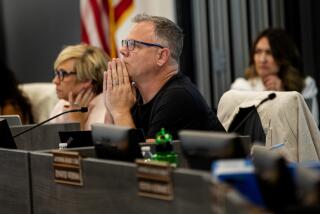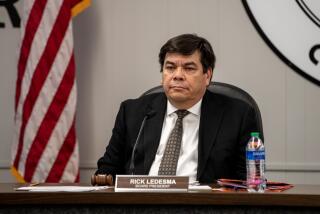Mobilizing for Recall in Westminster
- Share via
A group of Westminster mothers and teachers, eager foot soldiers in the grass-roots battle to recall school district trustees Judy Ahrens and Blossie Marquez-Woodcock, clustered around Mary Mangold’s kitchen counter.
Pushing aside a plate of homemade frosted cookies, they pored over computerized lists of registered voters, consulted neighborhood maps and talked strategy for getting at least 7,200 voters to sign petitions to put the recall on the November ballot.As the women grabbed their clipboards, Mangold, who lives just a block away from Ahrens, warned that, on these streets, some doors were sure to be shut in their faces.
“I’ve sold Girl Scout cookies in this neighborhood for four years,” Lisa Mathews said confidently. “People will open their doors for me.”
Tensions are still simmering in the Westminster School District, weeks after resolution of a political ruckus. The turmoil began when Ahrens, Marquez-Woodcock and trustee Helena Rutkowski, citing religious beliefs, took a stand against the gender language in a state antidiscrimination law -- a move that threatened to cost the district millions of dollars in state funding.
Trustees eventually adopted antidiscrimination language acceptable to the state, but parents and teachers are still pursuing a recall of Ahrens and Marquez-Woodcock. (Rutkowski, whose term expires in November, is not targeted.)
Recall proponents say it’s not a one-issue campaign over the so-called gender debate, but reflects a list of complaints they have with the trustees’ voting patterns.
In fact, they are downplaying the saga that erupted over the gender law and which left the small, usually tranquil, Orange County district reeling.
They acknowledge that the fight over the gender law polarized the community, with some voters rallying to the trustees’ support. So opponents say their best chance of maintaining momentum against the trustees is in portraying them as out of touch with the community -- a claim Ahrens and Marquez-Woodcock vigorously deny.
“The gender issue was such an emotional one for people, and we’re not going to change anyone’s mind on it,” said Louise MacIntyre, a parent and special education caseworker for the district who is heading the recall effort. “It brought all this to the surface, but it has come and gone. The issue now is: What are they going to be voting on in the future?”
The recall push was triggered after the three trustees, who form a majority of the five-member board, rejected the wording of the state law, which is meant to protect gays, transsexuals and others who do not conform to traditional gender roles. The law, they said, offended their Christian beliefs by allowing people to define their gender.
State schools chief Jack O’Connell threatened to withhold millions of dollars in funding if the district did not conform, prompting many in the community to assail the three for placing their personal beliefs above their duty to uphold state law. Normally mundane district meetings erupted into heated, standing-room-only affairs at which trustees arrived under police escort. As a state-imposed deadline expired, the three trustees amended the district discrimination policy enough to adhere to the law, while including additional language that made their objections clear.
Ahrens is the primary target in the recall crosshairs, as organizers hope to convince voters she has a history of casting controversial votes since being elected by a narrow margin in 2000.
Instead of talking about gender discrimination, Mangold and about 100 other recall activists are armed with transcripts from meetings at which Ahrens voted against funding for preschools and a state grant for more computers in classrooms.
Ahrens declined to be interviewed, but defended her voting record in a written response, saying it was “in alignment with the philosophy I campaigned on” to be elected. On a website from her campaign, Ahrens promised to fight the “anti-family” gender law.
Marquez-Woodcock is a target, MacIntyre said, because of her alliance with Ahrens and Rutkowski. “She’s never had a strong opinion of her own,” MacIntyre said. “She used to look to others, and now she is looking to [Ahrens and Rutkowski].... What issue will come up next that she’ll hold the same disdain and contempt for the public?”
Marquez-Woodcock dismissed such criticism. “We had an issue that we all stood together on because of what we believe,” she said. “But I may not vote with them in the future.”
The recall strategy resonated with Doris Hunter, a district employee who signed the petitions that volunteers were circulating outside an elementary school last week. Hunter said she agrees with the moral position of the three trustees, but felt the recall was about larger issues.
“I really tried to stay away from taking a side on this,” she said as she signed her name to a petition. “A lot of what they said makes sense, but I’m convinced they’ve gone too far.”
Unlike Ahrens, Marquez-Woodcock said that even though the gender-law fight has subsided, she is not surprised that parents and teachers are still pushing for their ouster. “We have a lynch mob. When people do not get what they want, they get ugly,” she said. “We should really move on, but they won’t allow it.”
MacIntyre estimated that, after two weeks on the streets, parents, teachers and district administrators had collected about 2,000 of the 7,200 signatures needed by June 14 to qualify the recall for a Nov. 2 vote. If the deadline is missed, recall proponents could still hope to qualify for a special election.
Of the estimated 100 recall attempts over 18 years in the county, fewer than a dozen have reached the ballot, said Suzanne Slupsky, Orange County’s assistant registrar of voters.
“There is always an enormous amount of passion at the beginning, because people are angry,” she said. “But then they go out for signatures and lose momentum. They don’t understand what a huge undertaking it is.”
More to Read
Sign up for Essential California
The most important California stories and recommendations in your inbox every morning.
You may occasionally receive promotional content from the Los Angeles Times.













